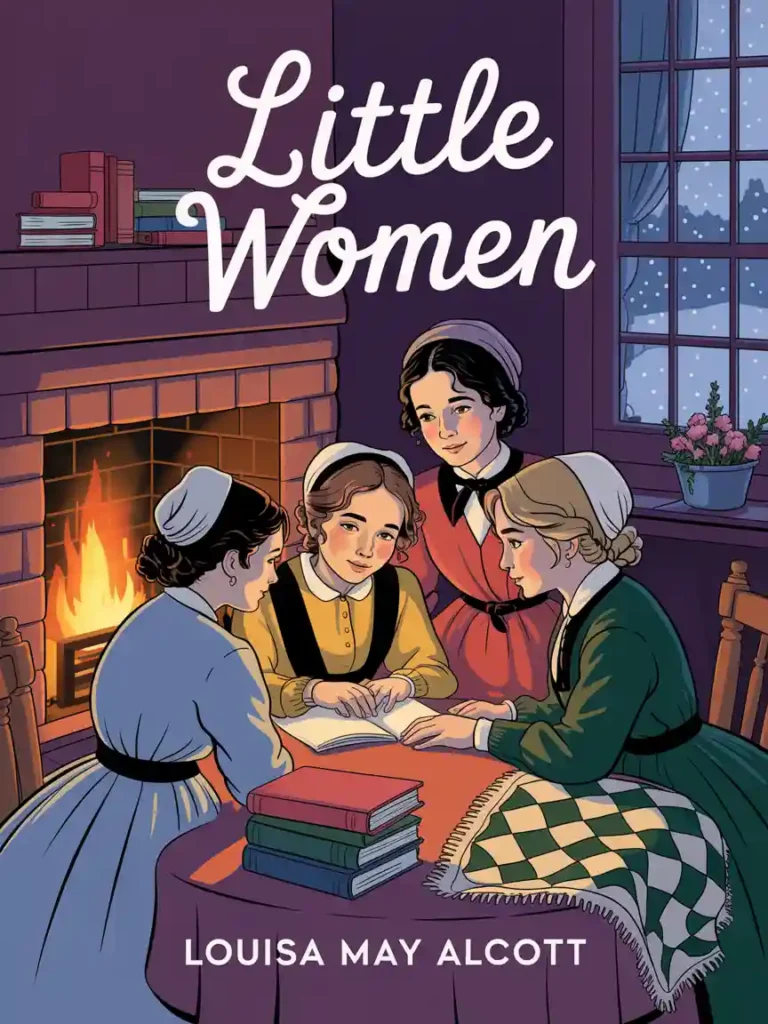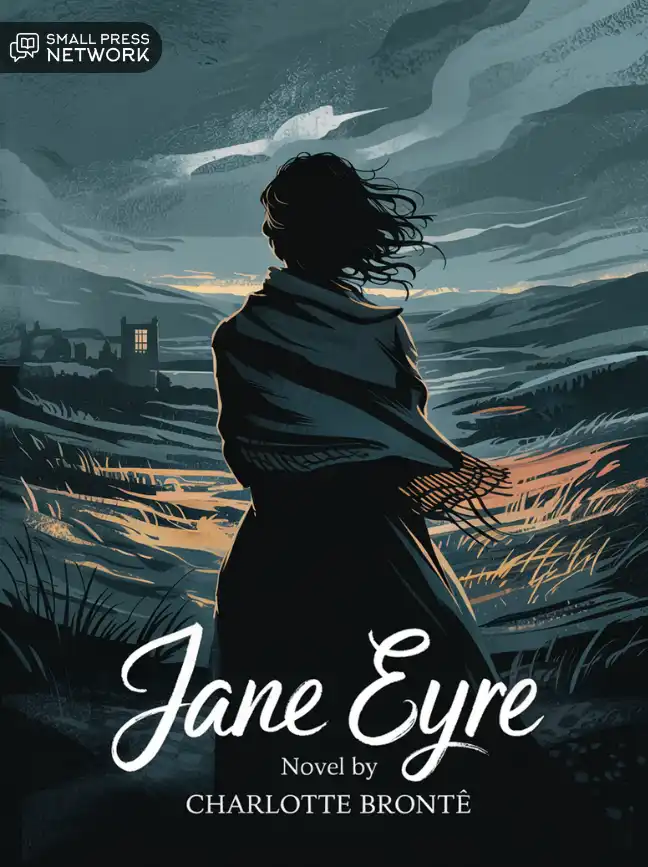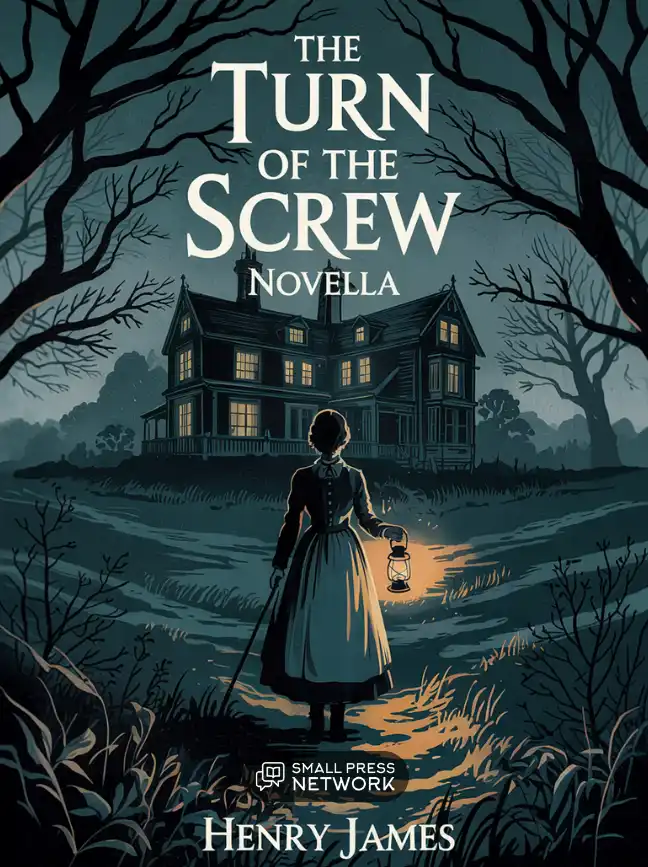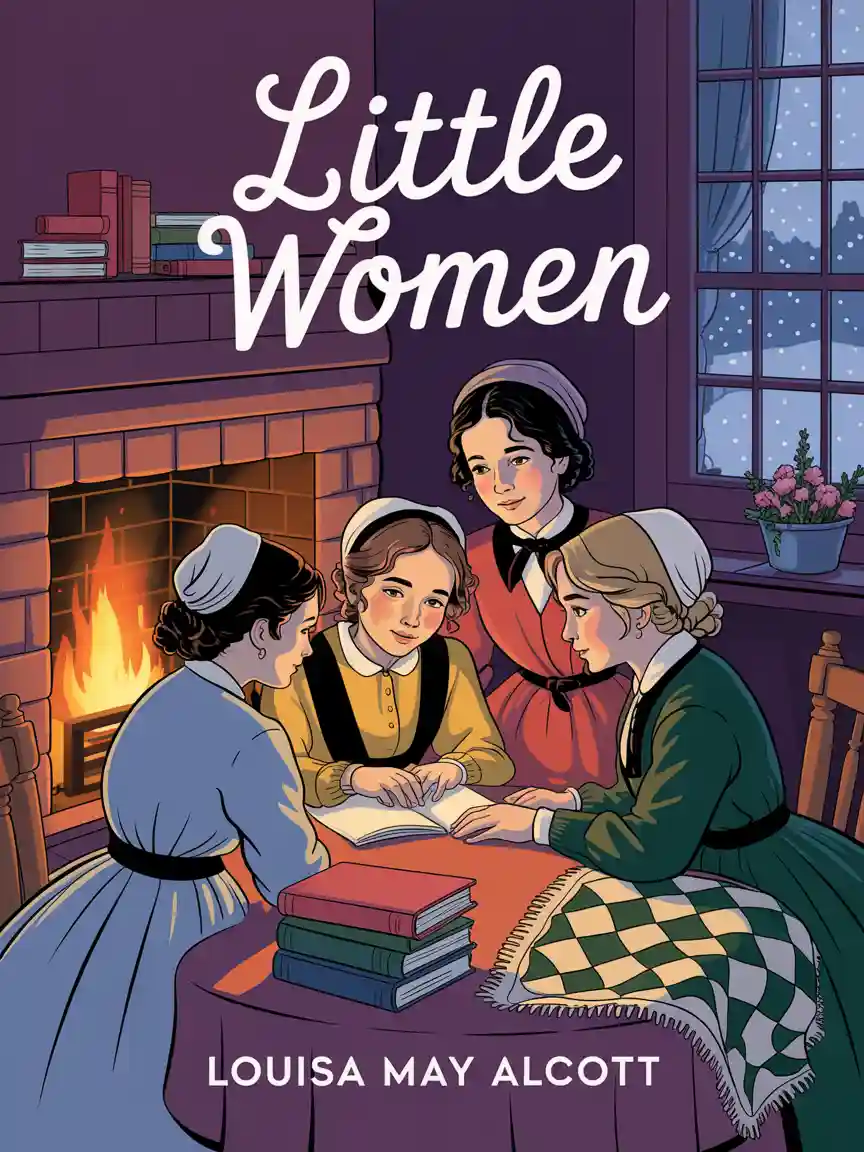CHAPTER THREE
THE LAURENCE BOY
“Jo! Jo! Where are you?” cried Meg at the foot of the garret stairs.
“Here!” answered a husky voice from above, and, running up, Meg found
her sister eating apples and crying over the Heir of Redclyffe, wrapped up
in a comforter on an old three-legged sofa by the sunny window. This was
Jo’s favorite refuge, and here she loved to retire with half a dozen russets
and a nice book, to enjoy the quiet and the society of a pet rat who lived
near by and didn’t mind her a particle. As Meg appeared, Scrabble whisked
into his hole. Jo shook the tears off her cheeks and waited to hear the news.
“Such fun! Only see! A regular note of invitation from Mrs. Gardiner for
tomorrow night!” cried Meg, waving the precious paper and then
proceeding to read it with girlish delight.
“‘Mrs. Gardiner would be happy to see Miss March and Miss Josephine
at a little dance on New Year’s Eve.’ Marmee is willing we should go, now
what shall we wear?”
“What’s the use of asking that, when you know we shall wear our
poplins, because we haven’t got anything else?” answered Jo with her
mouth full.
“If I only had a silk!” sighed Meg. “Mother says I may when I’m
eighteen perhaps, but two years is an everlasting time to wait.”
“I’m sure our pops look like silk, and they are nice enough for us. Yours
is as good as new, but I forgot the burn and the tear in mine. Whatever shall
I do? The burn shows badly, and I can’t take any out.”
“You must sit still all you can and keep your back out of sight. The front
is all right. I shall have a new ribbon for my hair, and Marmee will lend me
her little pearl pin, and my new slippers are lovely, and my gloves will do,
though they aren’t as nice as I’d like.”
“Mine are spoiled with lemonade, and I can’t get any new ones, so I shall
have to go without,” said Jo, who never troubled herself much about dress.
“You must have gloves, or I won’t go,” cried Meg decidedly. “Gloves are
more important than anything else. You can’t dance without them, and if
you don’t I should be so mortified.”
“Then I’ll stay still. I don’t care much for company dancing. It’s no fun to
go sailing round. I like to fly about and cut capers.”
“You can’t ask Mother for new ones, they are so expensive, and you are
so careless. She said when you spoiled the others that she shouldn’t get you
any more this winter. Can’t you make them do?”
“I can hold them crumpled up in my hand, so no one will know how
stained they are. That’s all I can do. No! I’ll tell you how we can manage,
each wear one good one and carry a bad one. Don’t you see?”
“Your hands are bigger than mine, and you will stretch my glove
dreadfully,” began Meg, whose gloves were a tender point with her.
“Then I’ll go without. I don’t care what people say!” cried Jo, taking up
her book.
“You may have it, you may! Only don’t stain it, and do behave nicely.
Don’t put your hands behind you, or stare, or say ‘Christopher Columbus!’
will you?”
“Don’t worry about me. I’ll be as prim as I can and not get into any
scrapes, if I can help it. Now go and answer your note, and let me finish this
splendid story.”
So Meg went away to ‘accept with thanks’, look over her dress, and sing
blithely as she did up her one real lace frill, while Jo finished her story, her
four apples, and had a game of romps with Scrabble.
On New Year’s Eve the parlor was deserted, for the two younger girls
played dressing maids and the two elder were absorbed in the all-important
business of ‘getting ready for the party’. Simple as the toilets were, there
was a great deal of running up and down, laughing and talking, and at one
time a strong smell of burned hair pervaded the house. Meg wanted a few
curls about her face, and Jo undertook to pinch the papered locks with a pair
of hot tongs.
“Ought they to smoke like that?” asked Beth from her perch on the bed.
“It’s the dampness drying,” replied Jo.
“What a queer smell! It’s like burned feathers,” observed Amy,
smoothing her own pretty curls with a superior air.
“There, now I’ll take off the papers and you’ll see a cloud of little
ringlets,” said Jo, putting down the tongs.
She did take off the papers, but no cloud of ringlets appeared, for the hair
came with the papers, and the horrified hairdresser laid a row of little
scorched bundles on the bureau before her victim.
“Oh, oh, oh! What have you done? I’m spoiled! I can’t go! My hair, oh,
my hair!” wailed Meg, looking with despair at the uneven frizzle on her
forehead.
“Just my luck! You shouldn’t have asked me to do it. I always spoil
everything. I’m so sorry, but the tongs were too hot, and so I’ve made a
mess,” groaned poor Jo, regarding the little black pancakes with tears of
regret.
“It isn’t spoiled. Just frizzle it, and tie your ribbon so the ends come on
your forehead a bit, and it will look like the last fashion. I’ve seen many
girls do it so,” said Amy consolingly.
“Serves me right for trying to be fine. I wish I’d let my hair alone,” cried
Meg petulantly.
“So do I, it was so smooth and pretty. But it will soon grow out again,”
said Beth, coming to kiss and comfort the shorn sheep.
After various lesser mishaps, Meg was finished at last, and by the united
exertions of the entire family Jo’s hair was got up and her dress on. They
looked very well in their simple suits, Meg’s in silvery drab, with a blue
velvet snood, lace frills, and the pearl pin. Jo in maroon, with a stiff,
gentlemanly linen collar, and a white chrysanthemum or two for her only
ornament. Each put on one nice light glove, and carried one soiled one, and
all pronounced the effect “quite easy and fine”. Meg’s high-heeled slippers
were very tight and hurt her, though she would not own it, and Jo’s nineteen
hairpins all seemed stuck straight into her head, which was not exactly
comfortable, but, dear me, let us be elegant or die.
“Have a good time, dearies!” said Mrs. March, as the sisters went daintily
down the walk. “Don’t eat much supper, and come away at eleven when I
send Hannah for you.” As the gate clashed behind them, a voice cried from
a window…
“Girls, girls! Have you you both got nice pocket handkerchiefs?”
“Yes, yes, spandy nice, and Meg has cologne on hers,” cried Jo, adding
with a laugh as they went on, “I do believe Marmee would ask that if we
were all running away from an earthquake.”
“It is one of her aristocratic tastes, and quite proper, for a real lady is
always known by neat boots, gloves, and handkerchief,” replied Meg, who
had a good many little ‘aristocratic tastes’ of her own.
“Now don’t forget to keep the bad breadth out of sight, Jo. Is my sash
right? And does my hair look very bad?” said Meg, as she turned from the
glass in Mrs. Gardiner’s dressing room after a prolonged prink.
“I know I shall forget. If you see me doing anything wrong, just remind
me by a wink, will you?” returned Jo, giving her collar a twitch and her
head a hasty brush.
“No, winking isn’t ladylike. I’ll lift my eyebrows if any thing is wrong,
and nod if you are all right. Now hold your shoulder straight, and take short
steps, and don’t shake hands if you are introduced to anyone. It isn’t the
thing.”
“How do you learn all the proper ways? I never can. Isn’t that music
gay?”
Down they went, feeling a trifle timid, for they seldom went to parties,
and informal as this little gathering was, it was an event to them. Mrs.
Gardiner, a stately old lady, greeted them kindly and handed them over to
the eldest of her six daughters. Meg knew Sallie and was at her ease very
soon, but Jo, who didn’t care much for girls or girlish gossip, stood about,
with her back carefully against the wall, and felt as much out of place as a
colt in a flower garden. Half a dozen jovial lads were talking about skates in
another part of the room, and she longed to go and join them, for skating
was one of the joys of her life. She telegraphed her wish to Meg, but the
eyebrows went up so alarmingly that she dared not stir. No one came to talk
to her, and one by one the group dwindled away till she was left alone. She
could not roam about and amuse herself, for the burned breadth would
show, so she stared at people rather forlornly till the dancing began. Meg
was asked at once, and the tight slippers tripped about so briskly that none
would have guessed the pain their wearer suffered smilingly. Jo saw a big
red headed youth approaching her corner, and fearing he meant to engage
her, she slipped into a curtained recess, intending to peep and enjoy herself
in peace. Unfortunately, another bashful person had chosen the same refuge,
for, as the curtain fell behind her, she found herself face to face with the
‘Laurence boy’.
“Dear me, I didn’t know anyone was here!” stammered Jo, preparing to
back out as speedily as she had bounced in.
But the boy laughed and said pleasantly, though he looked a little
startled, “Don’t mind me, stay if you like.”
“Shan’t I disturb you?”
“Not a bit. I only came here because I don’t know many people and felt
rather strange at first, you know.”
“So did I. Don’t go away, please, unless you’d rather.”
The boy sat down again and looked at his pumps, till Jo said, trying to be
polite and easy, “I think I’ve had the pleasure of seeing you before. You live
near us, don’t you?”
“Next door.” And he looked up and laughed outright, for Jo’s prim
manner was rather funny when he remembered how they had chatted about
cricket when he brought the cat home.
That put Jo at her ease and she laughed too, as she said, in her heartiest
way, “We did have such a good time over your nice Christmas present.”
“Grandpa sent it.”
“But you put it into his head, didn’t you, now?”
“How is your cat, Miss March?” asked the boy, trying to look sober while
his black eyes shone with fun.
“Nicely, thank you, Mr. Laurence. But I am not Miss March, I’m only
Jo,” returned the young lady.
“I’m not Mr. Laurence, I’m only Laurie.”
“Laurie Laurence, what an odd name.”
“My first name is Theodore, but I don’t like it, for the fellows called me
Dora, so I made them say Laurie instead.”
“I hate my name, too, so sentimental! I wish every one would say Jo
instead of Josephine. How did you make the boys stop calling you Dora?”
“I thrashed ’em.”
“I can’t thrash Aunt March, so I suppose I shall have to bear it.” And Jo
resigned herself with a sigh.
“Don’t you like to dance, Miss Jo?” asked Laurie, looking as if he
thought the name suited her.
“I like it well enough if there is plenty of room, and everyone is lively. In
a place like this I’m sure to upset something, tread on people’s toes, or do
something dreadful, so I keep out of mischief and let Meg sail about. Don’t
you dance?”
“Sometimes. You see I’ve been abroad a good many years, and haven’t
been into company enough yet to know how you do things here.”
“Abroad!” cried Jo. “Oh, tell me about it! I love dearly to hear people
describe their travels.”
Laurie didn’t seem to know where to begin, but Jo’s eager questions soon
set him going, and he told her how he had been at school in Vevay, where
the boys never wore hats and had a fleet of boats on the lake, and for
holiday fun went on walking trips about Switzerland with their teachers.
“Don’t I wish I’d been there!” cried Jo. “Did you go to Paris?”
“We spent last winter there.”
“Can you talk French?”
“We were not allowed to speak anything else at Vevay.”
“Do say some! I can read it, but can’t pronounce.”
“Quel nom a cette jeune demoiselle en les pantoufles jolis?”
“How nicely you do it! Let me see … you said, ‘Who is the young lady in
the pretty slippers’, didn’t you?”
“Oui, mademoiselle.”
“It’s my sister Margaret, and you knew it was! Do you think she is
pretty?”
“Yes, she makes me think of the German girls, she looks so fresh and
quiet, and dances like a lady.”
Jo quite glowed with pleasure at this boyish praise of her sister, and
stored it up to repeat to Meg. Both peeped and criticized and chatted till
they felt like old acquaintances. Laurie’s bashfulness soon wore off, for Jo’s
gentlemanly demeanor amused and set him at his ease, and Jo was her
merry self again, because her dress was forgotten and nobody lifted their
eyebrows at her. She liked the ‘Laurence boy’ better than ever and took
several good looks at him, so that she might describe him to the girls, for
they had no brothers, very few male cousins, and boys were almost
unknown creatures to them.
“Curly black hair, brown skin, big black eyes, handsome nose, fine teeth,
small hands and feet, taller than I am, very polite, for a boy, and altogether
jolly. Wonder how old he is?”
It was on the tip of Jo’s tongue to ask, but she checked herself in time
and, with unusual tact, tried to find out in a round-about way.
“I suppose you are going to college soon? I see you pegging away at your
books, no, I mean studying hard.” And Jo blushed at the dreadful ‘pegging’
which had escaped her.
Laurie smiled but didn’t seem shocked, and answered with a shrug. “Not
for a year or two. I won’t go before seventeen, anyway.”
“Aren’t you but fifteen?” asked Jo, looking at the tall lad, whom she had
imagined seventeen already.
“Sixteen, next month.”
“How I wish I was going to college! You don’t look as if you liked it.”
“I hate it! Nothing but grinding or skylarking. And I don’t like the way
fellows do either, in this country.”
“What do you like?”
“To live in Italy, and to enjoy myself in my own way.”
Jo wanted very much to ask what his own way was, but his black brows
looked rather threatening as he knit them, so she changed the subject by
saying, as her foot kept time, “That’s a splendid polka! Why don’t you go
and try it?”
“If you will come too,” he answered, with a gallant little bow.
“I can’t, for I told Meg I wouldn’t, because…” There Jo stopped, and
looked undecided whether to tell or to laugh.
“Because, what?”
“You won’t tell?”
“Never!”
“Well, I have a bad trick of standing before the fire, and so I burn my
frocks, and I scorched this one, and though it’s nicely mended, it shows, and
Meg told me to keep still so no one would see it. You may laugh, if you
want to. It is funny, I know.”
But Laurie didn’t laugh. He only looked down a minute, and the
expression of his face puzzled Jo when he said very gently, “Never mind
that. I’ll tell you how we can manage. There’s a long hall out there, and we
can dance grandly, and no one will see us. Please come.”
Jo thanked him and gladly went, wishing she had two neat gloves when
she saw the nice, pearl-colored ones her partner wore. The hall was empty,
and they had a grand polka, for Laurie danced well, and taught her the
German step, which delighted Jo, being full of swing and spring. When the
music stopped, they sat down on the stairs to get their breath, and Laurie
was in the midst of an account of a students’ festival at Heidelberg when
Meg appeared in search of her sister. She beckoned, and Jo reluctantly
followed her into a side room, where she found her on a sofa, holding her
foot, and looking pale.
“I’ve sprained my ankle. That stupid high heel turned and gave me a sad
wrench. It aches so, I can hardly stand, and I don’t know how I’m ever
going to get home,” she said, rocking to and fro in pain.
“I knew you’d hurt your feet with those silly shoes. I’m sorry. But I don’t
see what you can do, except get a carriage, or stay here all night,” answered
Jo, softly rubbing the poor ankle as she spoke.
“I can’t have a carriage without its costing ever so much. I dare say I
can’t get one at all, for most people come in their own, and it’s a long way
to the stable, and no one to send.”
“I’ll go.”
“No, indeed! It’s past nine, and dark as Egypt. I can’t stop here, for the
house is full. Sallie has some girls staying with her. I’ll rest till Hannah
comes, and then do the best I can.”
“I’ll ask Laurie. He will go,” said Jo, looking relieved as the idea
occurred to her.
“Mercy, no! Don’t ask or tell anyone. Get me my rubbers, and put these
slippers with our things. I can’t dance anymore, but as soon as supper is
over, watch for Hannah and tell me the minute she comes.”
“They are going out to supper now. I’ll stay with you. I’d rather.”
“No, dear, run along, and bring me some coffee. I’m so tired I can’t stir.”
So Meg reclined, with rubbers well hidden, and Jo went blundering away
to the dining room, which she found after going into a china closet, and
opening the door of a room where old Mr. Gardiner was taking a little
private refreshment. Making a dart at the table, she secured the coffee,
which she immediately spilled, thereby making the front of her dress as bad
as the back.
“Oh, dear, what a blunderbuss I am!” exclaimed Jo, finishing Meg’s
glove by scrubbing her gown with it.
“Can I help you?” said a friendly voice. And there was Laurie, with a full
cup in one hand and a plate of ice in the other.
“I was trying to get something for Meg, who is very tired, and someone
shook me, and here I am in a nice state,” answered Jo, glancing dismally
from the stained skirt to the coffee-colored glove.
“Too bad! I was looking for someone to give this to. May I take it to your
sister?”
“Oh, thank you! I’ll show you where she is. I don’t offer to take it
myself, for I should only get into another scrape if I did.”
Jo led the way, and as if used to waiting on ladies, Laurie drew up a little
table, brought a second installment of coffee and ice for Jo, and was so
obliging that even particular Meg pronounced him a ‘nice boy’. They had a
merry time over the bonbons and mottoes, and were in the midst of a quiet
game of Buzz, with two or three other young people who had strayed in,
when Hannah appeared. Meg forgot her foot and rose so quickly that she
was forced to catch hold of Jo, with an exclamation of pain.
“Hush! Don’t say anything,” she whispered, adding aloud, “It’s nothing. I
turned my foot a little, that’s all,” and limped upstairs to put her things on.
Hannah scolded, Meg cried, and Jo was at her wits’ end, till she decided
to take things into her own hands. Slipping out, she ran down and, finding a
servant, asked if he could get her a carriage. It happened to be a hired waiter
who knew nothing about the neighborhood and Jo was looking round for
help when Laurie, who had heard what she said, came up and offered his
grandfather’s carriage, which had just come for him, he said.
“It’s so early! You can’t mean to go yet?” began Jo, looking relieved but
hesitating to accept the offer.
“I always go early, I do, truly! Please let me take you home. It’s all on my
way, you know, and it rains, they say.”
That settled it, and telling him of Meg’s mishap, Jo gratefully accepted
and rushed up to bring down the rest of the party. Hannah hated rain as
much as a cat does so she made no trouble, and they rolled away in the
luxurious close carriage, feeling very festive and elegant. Laurie went on
the box so Meg could keep her foot up, and the girls talked over their party
in freedom.
“I had a capital time. Did you?” asked Jo, rumpling up her hair, and
making herself comfortable.
“Yes, till I hurt myself. Sallie’s friend, Annie Moffat, took a fancy to me,
and asked me to come and spend a week with her when Sallie does. She is
going in the spring when the opera comes, and it will be perfectly splendid,
if Mother only lets me go,” answered Meg, cheering up at the thought.
“I saw you dancing with the red headed man I ran away from. Was he
nice?”
“Oh, very! His hair is auburn, not red, and he was very polite, and I had a
delicious redowa with him.”
“He looked like a grasshopper in a fit when he did the new step. Laurie
and I couldn’t help laughing. Did you hear us?”
“No, but it was very rude. What were you about all that time, hidden
away there?”
Jo told her adventures, and by the time she had finished they were at
home. With many thanks, they said good night and crept in, hoping to
disturb no one, but the instant their door creaked, two little nightcaps
bobbed up, and two sleepy but eager voices cried out…
“Tell about the party! Tell about the party!”
With what Meg called ‘a great want of manners’ Jo had saved some
bonbons for the little girls, and they soon subsided, after hearing the most
thrilling events of the evening.
“I declare, it really seems like being a fine young lady, to come home
from the party in a carriage and sit in my dressing gown with a maid to wait
on me,” said Meg, as Jo bound up her foot with arnica and brushed her hair.
“I don’t believe fine young ladies enjoy themselves a bit more than we
do, in spite of our burned hair, old gowns, one glove apiece and tight
slippers that sprain our ankles when we are silly enough to wear them.” And
I think Jo was quite right.





